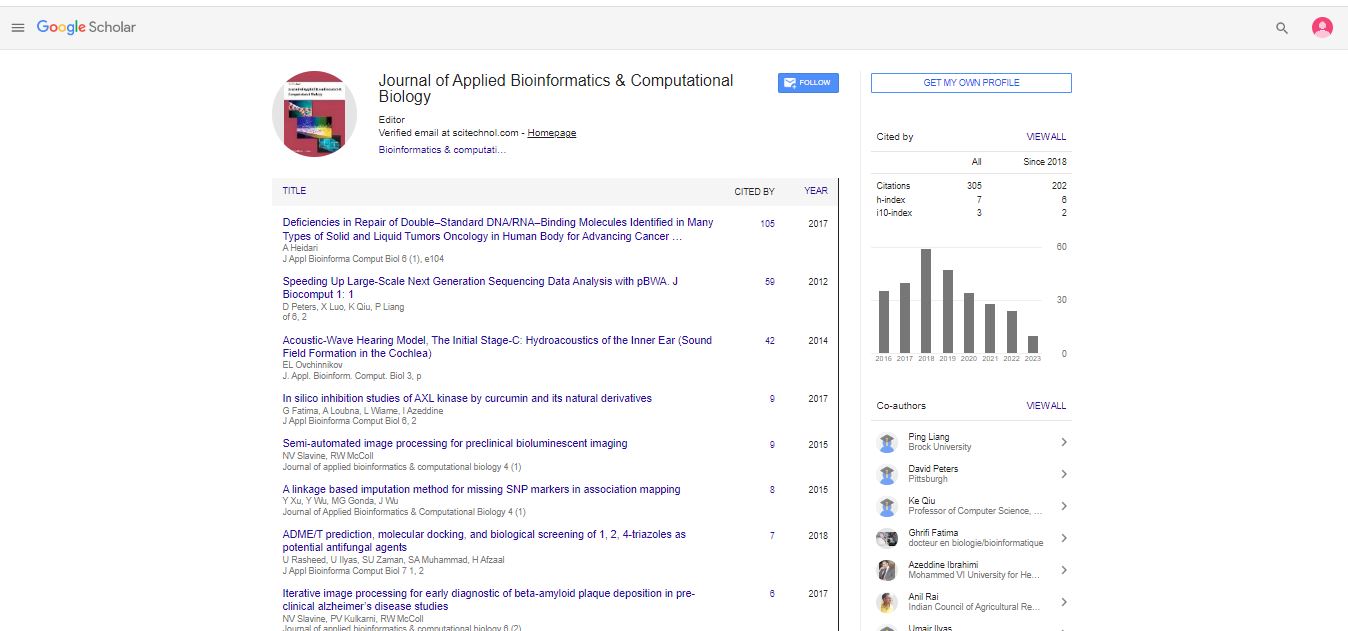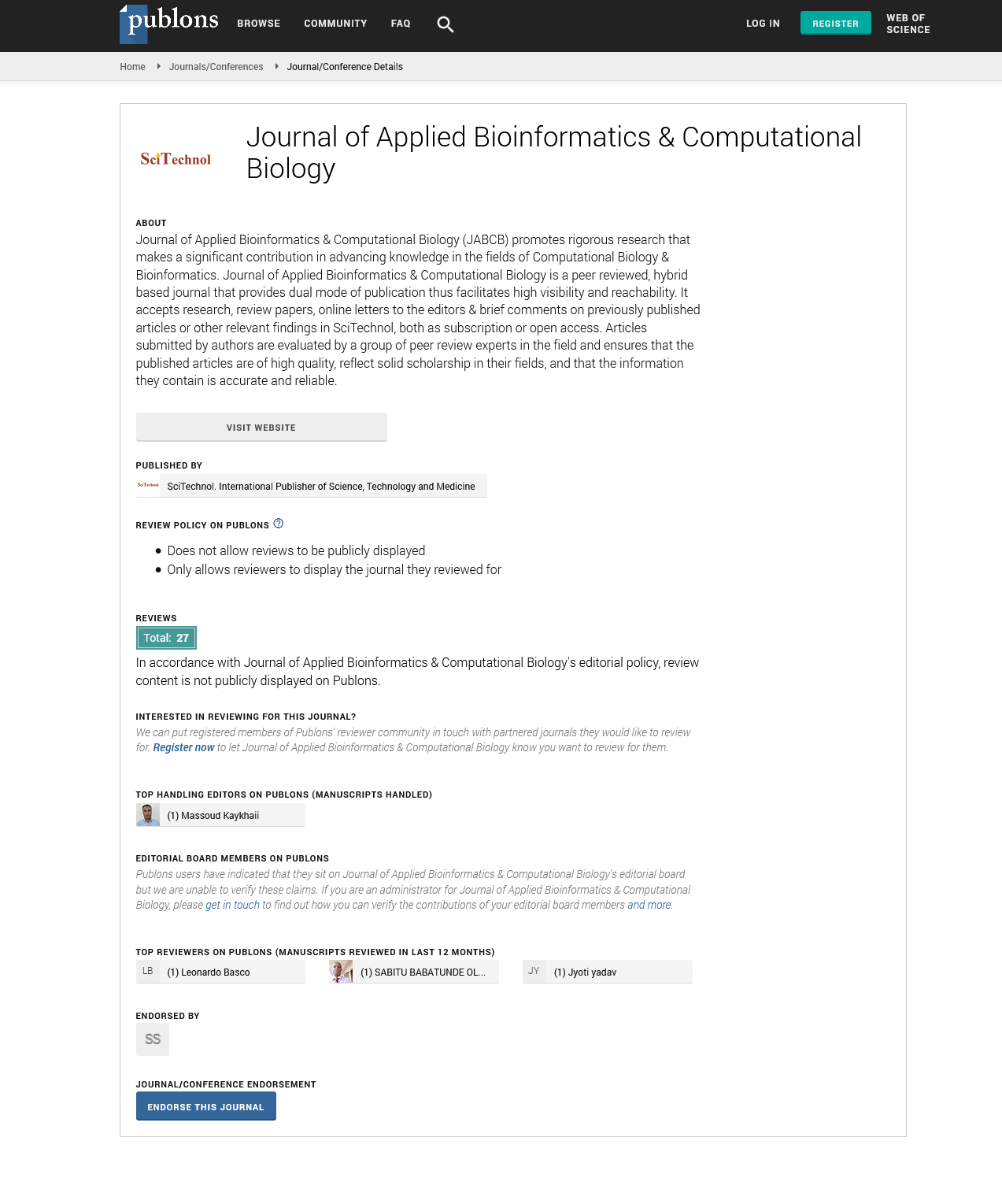Perspective, J Appl Bioinforma Comput Biol Vol: 11 Issue: 5
Human Local Body Site Microbiome of their Biology
Laura Meyer *
Department of Bioengineering, University of California, Los Angeles, USA
*Corresponding author: Laura Meyer
Department of Bioengineering, University of California, Los Angeles, USA
E-mail: laurameyer@gmail.com
Received date: 20 April, 2022, Manuscript No. JABCB-22-67890;
Editor assigned date: 22 April, 2022, PreQC No. JABCB-22-67890 (PQ);
Reviewed date: 06 May, 2022, QC No. JABCB-22-67890;
Revised date: 13 May, 2022, Manuscript No. JABCB-22-67890 (R);
Published date: 20 May, 2022, DOI: 10.4172/2329-9533.1000235
Citation: Meyer L (2022) Human Local Body Site Microbiome of their Biology. J Appl Bioinforma Comput Biol 11:5.
Keywords: Microbiome
Description
Microbiome may be a term that describes the ordination of all the microorganisms, dependent and infective, living in and on all vertebrates. The gut microbiome is comprised of the collective ordination of microbes inhabiting the gut together with bacterium, archaea, viruses, and fungi. Info concerning these microbes living in our guts is growing at an amazing rate. Until recently, nonuniformity among human populations was attributed to numerous factor sorts of genes. The human viscus harbors trillions of bacterium that represent a lot of ordination than all the human cells within the body. The distribution of microbes is abstraction within the gut, with the colon containing the biggest diversity and abundance of microorganisms. The colon additionally harbors a lot of aerobes than the tiny viscus, as a result of its proximity to the surroundings. Because of the anaerobic nature of the bulk of commensals, particularly within the higher gut, it's been troublesome to culture them. Advances in omics-based approaches have helped additional the understanding of internal organ scheme and also the multitude of things that impact its microorganism composition. This technology has opened several areas of analysis targeted on the role of internal organ microbiota in system physiological condition that impact health and illness. The human microbiome project initiated by the National Institutes of Health (NIH) in 2007 has known microbiota at varied surfaces of bod. The dominant phyla in humans embrace Firmicutes, Bacteroidetes, Proteobacteria, and Actinobacteria, with the viscus being dominated by Firmicutes and Bacteroidetes. The organization of the viscus begins at birth and has been shown to be influenced by duct or cesarian birth.2 However, the microbiota changes with exposure to numerous environmental factors throughout maturation. Very like a genetic imprint of a personal, every individual encompasses a distinctive microbiota, tho' some third of the species square measure common across most humans. Several factors influence internal organ microbiota together with hygiene, diet, geographical locations, and host genotype. Additionally, studies in humans and animals have recommended a job of sex hormones and age in decisive the internal organ microorganism composition. Humans have coevolved with the commensals and maintain a dependent relationship. Internal organ microbes out-compete the pathogens and maintain the integrity of the epithelial tissue which can be a key consider preventing inflammation. Numerous microorganism communities square measure essential for maintaining the internal organ scheme and play an important role in gathering energy from foods and manufacturing micronutrients. Reciprocally the microbes receive food and appropriate surroundings for growth.
Foetal Membranes
Emerging studies recommend that the placenta and foetus square measure exposed to microbes in utero, however the impact of such associate in nursing exposure remains to be totally appreciated. Prematurity as a complication of associate in nursing infection of the foetal membranes and either subclinical or clinical chorioamnionitis might alter the in utero exposure to microbes. The rupture of the foetal membranes and resultant delivery offer substantial exposure to new maternal and environmental microbes that may assume common places within the developing microbiota. Mode of delivery encompasses a major influence on the first life microbiome, with ductly delivered infants turning into acutely settled with internal organ organisms that mirror the mother's vaginal tract and infants delivered by cesarian section turning into settled with organisms reflective of maternal skin and rima, together with staphylococci and streptococci, yet because the encompassing surroundings.
In the newborn delivered vaginally, the primary internal organ microbes, questionable pioneering organisms, include Escherichia and different bacteria family, bacteria genus, and Parabacteroides. Exclusive breastfeeding has been according to end in high levels of bifidobacteria and Lactobacillus within the week following the beginning of feeding. These probiotic organisms have distinctive capacities to exclude would-be pathogens from organization by sequestering nutrients and manufacturing antimicrobial factors whereas stimulating the internal organ epithelial tissue to tighten cellular junctions and specific antimicrobial peptides. However, these genera are notably deficient from some breastfed babe cohorts, significantly within the us. The preterm baby is a lot of seemingly to be delivered by cesarian section and therefore is a lot of copiously settled with skin-related organisms like coagulase-negative staphylococci, like the newborn delivered by cesarian section. However, the preterm baby might fail to progress through a similar stages of enlargement and diversification of the microbiome over the first week to month of life because the newborn. The factors associated with the delayed maturation aren't totally clear however square measure predictably associated with delayed or restricted enteral feeding, traditional surroundings exposure to the unit environment, and exposure to medical interventions like antimicrobial medical aid.
Phosphotransferase System
The most vital shift within the internal organ microbiota seems to once commutation and also the introduction of solid foods. Because the babe transitions from breast milk to a solid-food diet containing complicated plant-derived polysaccharides, the microbiota begins to reshape into a more mature composition getting down to fit the adult microbiota. At a similar time, the metabolic potential of the microbiome shifts to accommodate the dynamical diet, with the newborn microbiome enriched with phosphotransferase system genes so shifting to increasing abundance of milk sugar transporter genes by 4???mo ancient, reflective milk intake, and additional shifting to a high abundance of genes like and enzymes necessary to interrupt down complicated carbohydrates by age 12???mo. The maturation of the childhood microbiome once the first years to adulthood is a smaller amount well understood, and a lot of studies square measure needed in giant numbers of kids to grasp totally the biological process stages of maturation and similarity to the mature, healthy adult state.
The microbiome seemingly impacts bladder cancer at many various stages of its development and treatment. Until now, the potential to have an effect on the bladder microenvironment through the utilization of probiotics has been restricted, attributable to the difficulties of inculcation strains directly into the bladder. However, delicate changes within the microenvironment might not need such Associate in Nursing invasive procedure, and doubtless seeding the bladder via oral intake of probiotics then ascension from the body part and duct, or modulation through metabolites excreted in wee from the gut microbiome, may work. Bacterium offers the primary line of defense against insults from pathogens, carcinogens, and different toxins. They will metabolise chemotherapeutical agents and manipulate however the host responds, and since of this we tend to square measure seemingly to ascertain vital investment in analysis of this space by pharmaceutical and different industries. drugs is advancing to a lot of personalised approaches and also the chop-chop rising ability to work out then alter, the microbiome of the tract has nice charm. The extent to that this actually influences bladder and different urinary cancers remains to be seen, however successive ten years ought to see exciting developments during this field.

